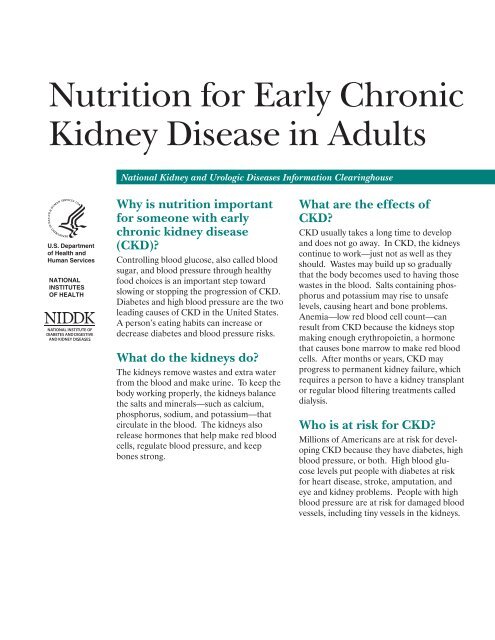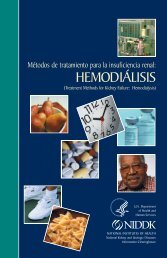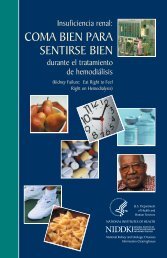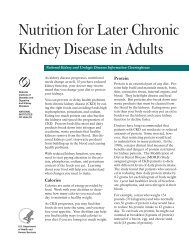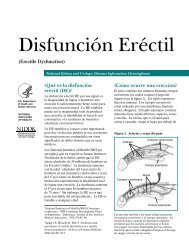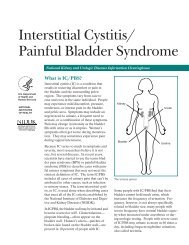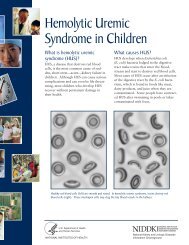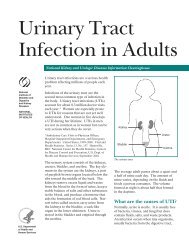Nutrition for Early Chronic Kidney Disease in Adults
Nutrition for Early Chronic Kidney Disease in Adults
Nutrition for Early Chronic Kidney Disease in Adults
Create successful ePaper yourself
Turn your PDF publications into a flip-book with our unique Google optimized e-Paper software.
<strong>Nutrition</strong> <strong>for</strong> <strong>Early</strong> <strong>Chronic</strong><br />
<strong>Kidney</strong> <strong>Disease</strong> <strong>in</strong> <strong>Adults</strong><br />
U.S. Department<br />
of Health and<br />
Human Services<br />
NATIONAL<br />
INSTITUTES<br />
OF HEALTH<br />
National <strong>Kidney</strong> and Urologic <strong>Disease</strong>s In<strong>for</strong>mation Clear<strong>in</strong>ghouse<br />
Why is nutrition important<br />
<strong>for</strong> someone with early<br />
chronic kidney disease<br />
(CKD)?<br />
Controll<strong>in</strong>g blood glucose, also called blood<br />
sugar, and blood pressure through healthy<br />
food choices is an important step toward<br />
slow<strong>in</strong>g or stopp<strong>in</strong>g the progression of CKD.<br />
Diabetes and high blood pressure are the two<br />
lead<strong>in</strong>g causes of CKD <strong>in</strong> the United States.<br />
A person’s eat<strong>in</strong>g habits can <strong>in</strong>crease or<br />
decrease diabetes and blood pressure risks.<br />
What do the kidneys do?<br />
The kidneys remove wastes and extra water<br />
from the blood and make ur<strong>in</strong>e. To keep the<br />
body work<strong>in</strong>g properly, the kidneys balance<br />
the salts and m<strong>in</strong>erals—such as calcium,<br />
phosphorus, sodium, and potassium—that<br />
circulate <strong>in</strong> the blood. The kidneys also<br />
release hormones that help make red blood<br />
cells, regulate blood pressure, and keep<br />
bones strong.<br />
What are the effects of<br />
CKD?<br />
CKD usually takes a long time to develop<br />
and does not go away. In CKD, the kidneys<br />
cont<strong>in</strong>ue to work—just not as well as they<br />
should. Wastes may build up so gradually<br />
that the body becomes used to hav<strong>in</strong>g those<br />
wastes <strong>in</strong> the blood. Salts conta<strong>in</strong><strong>in</strong>g phosphorus<br />
and potassium may rise to unsafe<br />
levels, caus<strong>in</strong>g heart and bone problems.<br />
Anemia—low red blood cell count—can<br />
result from CKD because the kidneys stop<br />
mak<strong>in</strong>g enough erythropoiet<strong>in</strong>, a hormone<br />
that causes bone marrow to make red blood<br />
cells. After months or years, CKD may<br />
progress to permanent kidney failure, which<br />
requires a person to have a kidney transplant<br />
or regular blood flter<strong>in</strong>g treatments called<br />
dialysis.<br />
Who is at risk <strong>for</strong> CKD?<br />
Millions of Americans are at risk <strong>for</strong> develop<strong>in</strong>g<br />
CKD because they have diabetes, high<br />
blood pressure, or both. High blood glucose<br />
levels put people with diabetes at risk<br />
<strong>for</strong> heart disease, stroke, amputation, and<br />
eye and kidney problems. People with high<br />
blood pressure are at risk <strong>for</strong> damaged blood<br />
vessels, <strong>in</strong>clud<strong>in</strong>g t<strong>in</strong>y vessels <strong>in</strong> the kidneys.
What does a person with<br />
CKD and diabetes need<br />
to know about food and<br />
controll<strong>in</strong>g blood glucose?<br />
People with either type 1 or type 2 diabetes<br />
must choose foods carefully to control their<br />
blood glucose, the body’s ma<strong>in</strong> source of<br />
energy. Follow<strong>in</strong>g a meal plan to keep blood<br />
glucose at a healthy level may prevent CKD<br />
from develop<strong>in</strong>g.<br />
People with diabetes should talk with their<br />
health care provider about sett<strong>in</strong>g goals <strong>for</strong><br />
ma<strong>in</strong>ta<strong>in</strong><strong>in</strong>g healthy blood glucose levels and<br />
about how often to check their blood glucose<br />
level. The results from these blood glucose<br />
checks <strong>in</strong>dicate whether a person’s meal plan<br />
is help<strong>in</strong>g to keep diabetes under control.<br />
People with diabetes should also ask their<br />
doctor <strong>for</strong> an A1C test at least twice a year.<br />
The A1C number refects a person’s average<br />
blood glucose level over the past 2 to<br />
3 months.<br />
Follow<strong>in</strong>g regular, daily habits can help<br />
ma<strong>in</strong>ta<strong>in</strong> healthy blood glucose levels:<br />
• Eat<strong>in</strong>g about the same amount of food<br />
each day.<br />
• Eat<strong>in</strong>g meals and snacks at about the<br />
same times each day.<br />
• Not skipp<strong>in</strong>g meals or snacks.<br />
• Tak<strong>in</strong>g medic<strong>in</strong>es at the same times<br />
each day.<br />
• Participat<strong>in</strong>g <strong>in</strong> physical activity every<br />
day.<br />
2 <strong>Nutrition</strong> <strong>for</strong> <strong>Early</strong> <strong>Chronic</strong> <strong>Kidney</strong> <strong>Disease</strong> <strong>in</strong> <strong>Adults</strong><br />
What does a person with<br />
CKD and high blood<br />
pressure need to know about<br />
food and controll<strong>in</strong>g blood<br />
pressure?<br />
As blood pressure rises, the risk of damage<br />
to the arteries, heart, bra<strong>in</strong>, and kidneys<br />
<strong>in</strong>creases. Controll<strong>in</strong>g blood pressure<br />
through healthy food choices and regular<br />
physical activity can delay or prevent the<br />
development of CKD.<br />
Blood pressure is expressed as two numbers.<br />
The top number represents the <strong>for</strong>ce of the<br />
blood push<strong>in</strong>g aga<strong>in</strong>st the artery walls when<br />
the heart beats. The lower number represents<br />
the pressure between beats. Normal<br />
blood pressure is below 120/80 millimeters<br />
of mercury (mmHg). People with CKD<br />
should try to keep their blood pressure below<br />
130/80 mmHg.<br />
Follow<strong>in</strong>g a meal plan can help control<br />
blood pressure and protect the kidneys. The<br />
National Heart, Lung, and Blood Institute<br />
supported research that compared a typical<br />
American diet with the Dietary Approaches<br />
to Stop Hypertension (DASH) eat<strong>in</strong>g plan,<br />
which is lower <strong>in</strong> saturated fat, cholesterol,<br />
and total fat and emphasizes eat<strong>in</strong>g fruits,<br />
vegetables, and low-fat dairy foods. People<br />
who followed the DASH eat<strong>in</strong>g plan were<br />
able to reduce their blood pressure much<br />
more than those who ate a typical diet. The<br />
DASH eat<strong>in</strong>g plan also <strong>in</strong>cludes whole gra<strong>in</strong><br />
products, fsh, poultry, and nuts. Limit<strong>in</strong>g<br />
sodium, or salt, is another important feature<br />
of the plan. A dietitian can help fnd low-salt<br />
or salt-free alternatives to foods that are high<br />
<strong>in</strong> salt.
What is medical nutrition<br />
therapy (MNT)?<br />
MNT is the use of nutrition counsel<strong>in</strong>g by<br />
a registered dietitian to help promote a<br />
medical or health goal. A doctor may refer<br />
a patient to a registered dietitian to help<br />
with the patient’s food plan. Many <strong>in</strong>surance<br />
policies cover MNT when recommended by a<br />
doctor. Anyone who qualifes <strong>for</strong> Medicare<br />
can receive a beneft <strong>for</strong> MNT from a registered<br />
dietitian or nutrition professional when<br />
a doctor provides a referral <strong>in</strong>dicat<strong>in</strong>g the<br />
person has diabetes or kidney disease.<br />
One way to locate a qualifed dietitian is to<br />
contact the American Dietetic Association<br />
at www.eatright.org and click on “F<strong>in</strong>d a<br />
Registered Dietitian.” Users can enter their<br />
address or ZIP code <strong>for</strong> a list of dietitians<br />
<strong>in</strong> their area. A person look<strong>in</strong>g <strong>for</strong> dietary<br />
advice to prevent kidney damage should click<br />
on “Renal (<strong>Kidney</strong>) <strong>Nutrition</strong>” <strong>in</strong> the specialty<br />
feld. Dietitians who specialize <strong>in</strong> help<strong>in</strong>g<br />
people with CKD are called renal dietitians.<br />
How can understand<strong>in</strong>g and<br />
keep<strong>in</strong>g track of lab reports<br />
help someone with early CKD<br />
make healthy food choices?<br />
Learn<strong>in</strong>g how to read and understand lab<br />
reports lets a person see how different foods<br />
can affect the kidneys. A doctor should<br />
order regular blood tests <strong>for</strong> people with<br />
CKD. Patients can ask their doctor <strong>for</strong><br />
copies of their lab reports and ask to have<br />
them expla<strong>in</strong>ed, not<strong>in</strong>g any results out of the<br />
normal range. Keep<strong>in</strong>g track of these lab<br />
results can help people see whether they are<br />
mak<strong>in</strong>g progress or gett<strong>in</strong>g worse. People<br />
with CKD should talk with their doctor or<br />
dietitian about how they can make healthier<br />
food choices. For example, a person who has<br />
a high A1C score should follow a diabetes<br />
meal plan to lower blood glucose levels.<br />
3 <strong>Nutrition</strong> <strong>for</strong> <strong>Early</strong> <strong>Chronic</strong> <strong>Kidney</strong> <strong>Disease</strong> <strong>in</strong> <strong>Adults</strong><br />
Po<strong>in</strong>ts to Remember<br />
• Controll<strong>in</strong>g blood glucose and<br />
blood pressure through healthy food<br />
choices is an important step toward<br />
slow<strong>in</strong>g or stopp<strong>in</strong>g the progression<br />
of chronic kidney disease (CKD).<br />
• The kidneys remove wastes and<br />
extra water from the blood and<br />
make ur<strong>in</strong>e.<br />
• Millions of Americans are at risk<br />
<strong>for</strong> develop<strong>in</strong>g CKD because they<br />
have diabetes, high blood pressure,<br />
or both.<br />
• People with either type 1 or type 2<br />
diabetes must choose foods carefully<br />
to control their blood glucose.<br />
Follow<strong>in</strong>g a meal plan to keep blood<br />
glucose at a healthy level may prevent<br />
CKD from develop<strong>in</strong>g.<br />
• Controll<strong>in</strong>g blood pressure through<br />
healthy food choices and regular<br />
physical activity can delay or prevent<br />
the development of CKD.<br />
People with CKD should try to<br />
keep their blood pressure below<br />
130/80 mmHg.<br />
• Medical nutrition therapy (MNT) is<br />
the use of counsel<strong>in</strong>g by a registered<br />
dietitian to help promote a medical<br />
or health goal.<br />
• Dietitians who specialize <strong>in</strong> help<strong>in</strong>g<br />
people with CKD are called renal<br />
dietitians.<br />
• Learn<strong>in</strong>g how to read and understand<br />
lab reports lets a person see<br />
how different foods can affect the<br />
kidneys. Patients can ask their doctor<br />
<strong>for</strong> copies of their lab reports<br />
and ask to have them expla<strong>in</strong>ed,<br />
not<strong>in</strong>g any results out of the normal<br />
range.
Hope through Research<br />
The National Institute of Diabetes and<br />
Digestive and <strong>Kidney</strong> <strong>Disease</strong>s (NIDDK) has<br />
many research programs aimed at slow<strong>in</strong>g<br />
the progression of CKD. For example, the<br />
NIDDK is sponsor<strong>in</strong>g the <strong>Chronic</strong> Renal<br />
Insuffciency Cohort study to determ<strong>in</strong>e<br />
the risk factors <strong>for</strong> rapid decl<strong>in</strong>e <strong>in</strong> kidney<br />
function and development of cardiovascular<br />
disease. This study of about 3,000 patients<br />
with chronic renal <strong>in</strong>suffciency, another way<br />
of describ<strong>in</strong>g CKD, will refect the racial,<br />
ethnic, and gender composition of the people<br />
<strong>in</strong> the United States who have permanent<br />
kidney failure. The data collected and<br />
specimens obta<strong>in</strong>ed will serve as a national<br />
resource <strong>for</strong> <strong>in</strong>vestigat<strong>in</strong>g CKD, as well as<br />
cardiovascular disease. Establish<strong>in</strong>g this<br />
group of patients and follow<strong>in</strong>g them <strong>in</strong>to the<br />
future also provides an opportunity to exam<strong>in</strong>e<br />
genetic, environmental, behavioral, nutritional,<br />
quality-of-life, and health resource<br />
use factors <strong>in</strong> this population. The ma<strong>in</strong> part<br />
of the study will consist of monitor<strong>in</strong>g participants<br />
and follow<strong>in</strong>g up at regular cl<strong>in</strong>ic visits<br />
with kidney function measurements, cardiovascular<br />
studies, and lab tests. In addition,<br />
participants will answer questionnaires to<br />
assess various demographic, nutritional, and<br />
quality-of-life factors.<br />
Participants <strong>in</strong> cl<strong>in</strong>ical trials can play a more<br />
active role <strong>in</strong> their own health care, ga<strong>in</strong><br />
access to new research treatments be<strong>for</strong>e<br />
they are widely available, and help others<br />
by contribut<strong>in</strong>g to medical research. For<br />
<strong>in</strong><strong>for</strong>mation about current studies, visit<br />
www.Cl<strong>in</strong>icalTrials.gov.<br />
4 <strong>Nutrition</strong> <strong>for</strong> <strong>Early</strong> <strong>Chronic</strong> <strong>Kidney</strong> <strong>Disease</strong> <strong>in</strong> <strong>Adults</strong><br />
Additional Read<strong>in</strong>g<br />
The follow<strong>in</strong>g fact sheets and brochures, as<br />
well as other <strong>in</strong><strong>for</strong>mation, are available on<br />
request from the organizations listed. Most<br />
of these resources can also be found onl<strong>in</strong>e<br />
at the web addresses given.<br />
D<strong>in</strong><strong>in</strong>g Out With Confdence: A Guide <strong>for</strong><br />
Patients With <strong>Kidney</strong> <strong>Disease</strong><br />
<strong>Nutrition</strong> and <strong>Chronic</strong> <strong>Kidney</strong> <strong>Disease</strong><br />
National <strong>Kidney</strong> Foundation<br />
30 East 33rd Street<br />
New York, NY 10016<br />
Phone: 1–800–622–9010 or 212–889–2210<br />
Internet: www.kidney.org<br />
Facts About the DASH Eat<strong>in</strong>g Plan<br />
National Heart, Lung, and Blood Institute<br />
In<strong>for</strong>mation Center<br />
P.O. Box 30105<br />
Bethesda, MD 20824–0105<br />
Phone: 301–592–8573<br />
TTY: 240–629–3255<br />
Fax: 301–592–8563<br />
Email: nhlbi<strong>in</strong>fo@nhlbi.nih.gov<br />
Internet: www.nhlbi.nih.gov<br />
A Healthy Food Guide <strong>for</strong> People with<br />
<strong>Chronic</strong> <strong>Kidney</strong> <strong>Disease</strong><br />
American Dietetic Association<br />
120 South Riverside Plaza, Suite 2000<br />
Chicago, IL 60606–6995<br />
Internet: www.eatright.org<br />
<strong>Kidney</strong> Beg<strong>in</strong>n<strong>in</strong>gs: A Patient’s Guide to Liv<strong>in</strong>g<br />
with Reduced <strong>Kidney</strong> Function<br />
American Association of <strong>Kidney</strong> Patients<br />
3505 East Frontage Road, Suite 315<br />
Tampa, FL 33607<br />
Phone: 1–800–749–2257 or 813–636–8100<br />
Email: <strong>in</strong>fo@aakp.org<br />
Internet: www.aakp.org
What I need to know about Eat<strong>in</strong>g and Diabetes<br />
National Diabetes In<strong>for</strong>mation<br />
Clear<strong>in</strong>ghouse<br />
1 In<strong>for</strong>mation Way<br />
Bethesda, MD 20892–3560<br />
Phone: 1–800–860–8747<br />
Email: ndic@<strong>in</strong>fo.niddk.nih.gov<br />
Internet: www.diabetes.niddk.nih.gov<br />
Eat<strong>in</strong>g Right <strong>for</strong> <strong>Kidney</strong> Health: Tips <strong>for</strong><br />
People with <strong>Chronic</strong> <strong>Kidney</strong> <strong>Disease</strong> (CKD)<br />
(onl<strong>in</strong>e only)<br />
Your <strong>Kidney</strong> Test Results (onl<strong>in</strong>e only)<br />
National <strong>Kidney</strong> <strong>Disease</strong> Education<br />
Program<br />
3 <strong>Kidney</strong> In<strong>for</strong>mation Way<br />
Bethesda, MD 20892<br />
Phone: 1–866–4–KIDNEY (1–866–454–3639)<br />
TTY: 1–866–569–1162<br />
Fax: 301–402–8182<br />
Email: nkdep@<strong>in</strong>fo.niddk.nih.gov<br />
Internet: www.nkdep.nih.gov<br />
For More In<strong>for</strong>mation<br />
American <strong>Kidney</strong> Fund<br />
6110 Executive Boulevard, Suite 1010<br />
Rockville, MD 20852<br />
Phone: 1–800–638–8299 or 1–866–300–2900<br />
Fax: 301–881–0898<br />
Email: helpl<strong>in</strong>e@kidneyfund.org<br />
Internet: www.kidneyfund.org<br />
Food and <strong>Nutrition</strong> In<strong>for</strong>mation Center<br />
National Agricultural Library<br />
10301 Baltimore Avenue, Room 105<br />
Beltsville, MD 20705–2351<br />
Phone: 301–504–5414<br />
Fax: 301–504–6409<br />
Email: fnic@ars.usda.gov<br />
Internet: www.nal.usda.gov/fnic<br />
5 <strong>Nutrition</strong> <strong>for</strong> <strong>Early</strong> <strong>Chronic</strong> <strong>Kidney</strong> <strong>Disease</strong> <strong>in</strong> <strong>Adults</strong><br />
Life Options<br />
c/o Medical Education Institute, Inc.<br />
414 D’Onofrio Drive, Suite 200<br />
Madison, WI 53719<br />
Phone: 1–800–468–7777<br />
Fax: 608–833–8366<br />
Email: lifeoptions@meiresearch.org<br />
Internet: www.lifeoptions.org<br />
The <strong>in</strong><strong>for</strong>mation <strong>in</strong> this fact sheet should<br />
not be used <strong>in</strong> the nutritional counsel<strong>in</strong>g of<br />
<strong>in</strong>fants, children, and adolescents with CKD.<br />
Families of pediatric patients with CKD<br />
should seek age-appropriate nutritional<br />
counsel<strong>in</strong>g from a pediatric renal dietitian.<br />
About the <strong>Nutrition</strong> <strong>for</strong><br />
<strong>Chronic</strong> <strong>Kidney</strong> <strong>Disease</strong><br />
Series<br />
The NIDDK <strong>Nutrition</strong> <strong>for</strong> <strong>Chronic</strong> <strong>Kidney</strong><br />
<strong>Disease</strong> Series <strong>in</strong>cludes three fact sheets:<br />
• <strong>Nutrition</strong> <strong>for</strong> <strong>Early</strong> <strong>Chronic</strong> <strong>Kidney</strong><br />
<strong>Disease</strong> <strong>in</strong> <strong>Adults</strong><br />
• <strong>Nutrition</strong> <strong>for</strong> Advanced <strong>Chronic</strong> <strong>Kidney</strong><br />
<strong>Disease</strong> <strong>in</strong> <strong>Adults</strong><br />
• <strong>Nutrition</strong> <strong>for</strong> <strong>Chronic</strong> <strong>Kidney</strong> <strong>Disease</strong> <strong>in</strong><br />
Children<br />
For free, s<strong>in</strong>gle, pr<strong>in</strong>ted copies of this<br />
series, please contact the National <strong>Kidney</strong><br />
and Urologic <strong>Disease</strong>s In<strong>for</strong>mation<br />
Clear<strong>in</strong>ghouse.<br />
You may also f<strong>in</strong>d additional <strong>in</strong><strong>for</strong>mation about this<br />
topic by visit<strong>in</strong>g Medl<strong>in</strong>ePlus at www.medl<strong>in</strong>eplus.gov.<br />
This publication may conta<strong>in</strong> <strong>in</strong><strong>for</strong>mation about<br />
medications. When prepared, this publication<br />
<strong>in</strong>cluded the most current <strong>in</strong><strong>for</strong>mation available.<br />
For updates or <strong>for</strong> questions about any medications,<br />
contact the U.S. Food and Drug Adm<strong>in</strong>istration tollfree<br />
at 1–888–INFO–FDA (1–888–463–6332) or visit<br />
www.fda.gov. Consult your health care provider <strong>for</strong><br />
more <strong>in</strong><strong>for</strong>mation.
Acknowledgments<br />
Publications produced by the Clear<strong>in</strong>ghouse<br />
are carefully reviewed by both NIDDK<br />
scientists and outside experts. This publication<br />
was orig<strong>in</strong>ally reviewed by Lisa<br />
Murphy-Gutekunst, M.S.Ed., R.D., C.S.R.,<br />
Cleve-Hill Dialysis, Buffalo, NY, and Marcy<br />
Bushman, M.P.H., R.D., L.D.N., Sigma-Tau<br />
Pharmaceuticals.<br />
National <strong>Kidney</strong> <strong>Disease</strong><br />
Education Program<br />
3 <strong>Kidney</strong> In<strong>for</strong>mation Way<br />
Bethesda, MD 20892<br />
Phone: 1–866–4–KIDNEY<br />
(1–866–454–3639)<br />
TTY: 1–866–569–1162<br />
Fax: 301–402–8182<br />
Email: nkdep@<strong>in</strong>fo.niddk.nih.gov<br />
Internet: www.nkdep.nih.gov<br />
The National <strong>Kidney</strong> <strong>Disease</strong> Education<br />
Program (NKDEP) is an <strong>in</strong>itiative of the<br />
National Institute of Diabetes and Digestive<br />
and <strong>Kidney</strong> <strong>Disease</strong>s, National Institutes<br />
of Health, U.S. Department of Health and<br />
Human Services. The NKDEP aims to<br />
raise awareness of the seriousness of kidney<br />
disease, the importance of test<strong>in</strong>g those at<br />
high risk, and the availability of treatment to<br />
prevent or slow kidney disease.<br />
National <strong>Kidney</strong> and<br />
Urologic <strong>Disease</strong>s<br />
In<strong>for</strong>mation Clear<strong>in</strong>ghouse<br />
3 In<strong>for</strong>mation Way<br />
Bethesda, MD 20892–3580<br />
Phone: 1–800–891–5390<br />
TTY: 1–866–569–1162<br />
Fax: 703–738–4929<br />
Email: nkudic@<strong>in</strong>fo.niddk.nih.gov<br />
Internet: www.kidney.niddk.nih.gov<br />
The National <strong>Kidney</strong> and Urologic <strong>Disease</strong>s<br />
In<strong>for</strong>mation Clear<strong>in</strong>ghouse (NKUDIC)<br />
is a service of the National Institute of<br />
Diabetes and Digestive and <strong>Kidney</strong> <strong>Disease</strong>s<br />
(NIDDK). The NIDDK is part of the<br />
National Institutes of Health of the U.S.<br />
Department of Health and Human Services.<br />
Established <strong>in</strong> 1987, the Clear<strong>in</strong>ghouse<br />
provides <strong>in</strong><strong>for</strong>mation about diseases of the<br />
kidneys and urologic system to people with<br />
kidney and urologic disorders and to their<br />
families, health care professionals, and the<br />
public. The NKUDIC answers <strong>in</strong>quiries,<br />
develops and distributes publications, and<br />
works closely with professional and patient<br />
organizations and Government agencies<br />
to coord<strong>in</strong>ate resources about kidney and<br />
urologic diseases.<br />
This publication is not copyrighted. The Clear<strong>in</strong>ghouse<br />
encourages users of this publication to duplicate and<br />
distribute as many copies as desired.<br />
This publication is available at<br />
www.kidney.niddk.nih.gov.<br />
U.S. DEPARTMENT OF HEALTH<br />
AND HUMAN SERVICES<br />
National Institutes of Health<br />
NIH Publication No. 11–5571<br />
April 2011<br />
The NIDDK pr<strong>in</strong>ts on recycled paper with bio-based <strong>in</strong>k.


